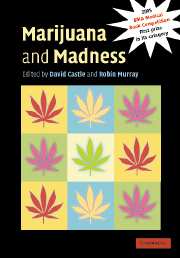Book contents
- Frontmatter
- Contents
- List of contributors
- Foreword
- Preface
- 1 The cannabinoid system: from the point of view of a chemist
- 2 How cannabis works in the brain
- 3 Acute and subacute psychomimetic effects of cannabis in humans
- 4 The association between cannabis use and depression: a review of the evidence
- 5 Cannabis and psychosis proneness
- 6 Is there a specific ‘cannabis psychosis’?
- 7 Cannabis as a potential causal factor in schizophrenia
- 8 Cannabis abuse and the course of schizophrenia
- 9 The endogenous cannabinoid system in schizophrenia
- 10 Cannabinoid ‘model’ psychosis, dopamine–cannabinoid interactions and implications for schizophrenia
- 11 Motives that maintain cannabis use among individuals with psychotic disorders
- 12 Addressing cannabis abuse in people with psychosis
- 13 Residual cognitive effects of long-term cannabis use
- Index
- References
13 - Residual cognitive effects of long-term cannabis use
Published online by Cambridge University Press: 07 December 2009
- Frontmatter
- Contents
- List of contributors
- Foreword
- Preface
- 1 The cannabinoid system: from the point of view of a chemist
- 2 How cannabis works in the brain
- 3 Acute and subacute psychomimetic effects of cannabis in humans
- 4 The association between cannabis use and depression: a review of the evidence
- 5 Cannabis and psychosis proneness
- 6 Is there a specific ‘cannabis psychosis’?
- 7 Cannabis as a potential causal factor in schizophrenia
- 8 Cannabis abuse and the course of schizophrenia
- 9 The endogenous cannabinoid system in schizophrenia
- 10 Cannabinoid ‘model’ psychosis, dopamine–cannabinoid interactions and implications for schizophrenia
- 11 Motives that maintain cannabis use among individuals with psychotic disorders
- 12 Addressing cannabis abuse in people with psychosis
- 13 Residual cognitive effects of long-term cannabis use
- Index
- References
Summary
Introduction
Previous chapters of this book have addressed the question of whether cannabis can cause or potentiate frank psychiatric syndromes such as psychotic disorders. Of course, the great majority of cannabis users, including even those who have used cannabis for decades, do not appear to exhibit serious psychiatric disorders (Gruber and Pope, 1996; Johns, 2001). But what about more subtle impairments? Do long-term heavy cannabis users experience residual deficits in cognition, even if they stop using cannabis for a substantial period?
This question has proven surprisingly difficult to answer, largely because of the formidable methodological problems confronting studies in this area. Although many of these same problems have been mentioned elsewhere in this volume, it is important to review them once again here. First, there is the problem of defining a ‘residual effect’. Presumably a ‘residual effect’ is an effect that persists after acute intoxication with cannabis has cleared. But how long an interval should be allowed between the last episode of cannabis use and the time of evaluation? Elsewhere (Pope et al., 2001a), we have suggested that effects present hours or days after last cannabis use, when cannabinoids are still present in the central nervous system (CNS), should be considered separately as ‘short-term residual effects’. In heavy cannabis users, such short-term effects may persist for many days or even weeks, since these individuals gradually accumulate a large burden of Δ9-tetrahydrocannabinol (Δ9-THC) in body fat stores, and this residue is only slowly excreted (Ashton, 2001).
- Type
- Chapter
- Information
- Marijuana and MadnessPsychiatry and Neurobiology, pp. 198 - 210Publisher: Cambridge University PressPrint publication year: 2004
References
- 5
- Cited by

